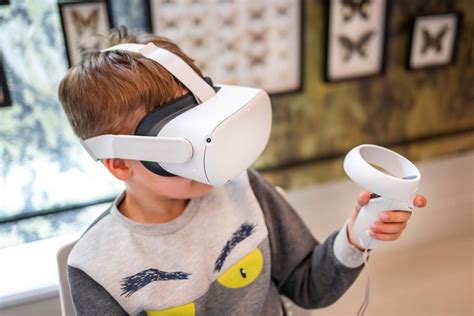In an age where digital entertainment is constantly evolving, family-friendly virtual reality (VR) games on the Oculus Quest 2 offer an exciting way for families to connect, play, and create lasting memories together. With immersive experiences that cater to players of all ages, these VR games provide an innovative escape from reality while ensuring a safe and engaging environment. This article explores what makes VR games suitable for family play, highlights the top five must-try titles, and discusses how VR enhances social interaction and bonding within families. Additionally, we’ll provide tips for establishing a safe gaming space and delve into the developmental benefits of these experiences for children. Join us as we navigate the future trends in family-friendly VR gaming, and discover how this technology can enrich your family time.
What Makes VR Games Family-Friendly for All Ages?
Family-friendly VR titles are designed with inclusivity and accessibility in mind, ensuring that players of all ages can enjoy the immersive experiences they offer. Here are some key features that contribute to making VR games suitable for families:
- Content Appropriateness: Family-friendly VR games typically feature themes, storylines, and visuals that are appropriate for younger audiences. This allows parents to feel confident in the gaming choices available to their children.
- Easy-to-Understand Mechanics: These games often come with straightforward gameplay mechanics that are easy to grasp. This is especially beneficial for younger players who may not have prior gaming experience.
- Collaborative Gameplay: Many family-friendly VR games encourage cooperative play, allowing family members to join forces to solve puzzles, achieve goals, or complete quests together, thus fostering teamwork and communication.
- Age-Based Customization: Some VR platforms provide customization options that allow parents to set appropriate difficulty levels or game modes based on the player’s age, ensuring a balanced experience for everyone.
- Physical Activity: Family-friendly VR games often incorporate physical movement, which can promote active play. This is a great way for families to get moving together in a fun and engaging way.
Overall, the emphasis on content, simplicity, collaboration, customization, and physical activity makes family-friendly VR an excellent choice for families looking to enjoy quality time together through gaming.
Top 5 Must-Try Family-Friendly VR Games on Oculus Quest 2
Embarking on a family-friendly VR gaming adventure is an exciting way to bond and have fun together. Here’s a list of the top 5 family-friendly VR games available on the Oculus Quest 2 that cater to all ages:
| Game Title | Age Rating | Description |
|---|---|---|
| Job Simulator | Everyone (E) | A humorous simulation game where players take on various job roles in a quirky future. |
| Rec Room | 10+ | A social VR space where players can create games, chat, and connect with others. |
| Fruit Ninja VR | Everyone (E) | An action-packed game where players slice fruits while avoiding bombs. |
| Wander | Everyone (E) | Explore the world in this immersive VR experience that offers educational content and virtual tours. |
| Astro Bot Rescue Mission | Everyone (E) | A charming platformer that combines adventure and puzzle-solving with delightful characters. |
These games not only entertain but also promote teamwork, creativity, and even a bit of friendly competition. Enjoy exploring these family-friendly VR titles together!
How Family-Friendly VR Enhances Social Interaction and Bonding
In today’s digital age, family-friendly VR has emerged as a remarkable tool for enhancing social interaction and strengthening family bonds. Virtual reality offers unique experiences that allow families to connect in immersive and engaging ways. Here are several key aspects of how family-friendly VR achieves this:
| Interaction Type | Benefits |
|---|---|
| Cooperative Games | Encourages teamwork and communication among family members to solve puzzles and complete challenges together. |
| Multiplayer Experiences | Allows family members to play together regardless of their physical distance, creating shared experiences even when apart. |
| Role Playing | Enables family members to adopt different personas and interact in ways that foster creativity and empathy. |
| Shared Adventures | Provides the opportunity for families to embark on virtual journeys together, fostering a sense of adventure and collaboration. |
Furthermore, VR experiences can become cherished family traditions. Whether it’s gathering for a weekly gaming night in a virtual setting or exploring new worlds as a family, these shared activities instill a sense of belonging and community.
family-friendly VR not only provides entertainment but also enhances the quality of interactions within the family unit. By engaging in these immersive experiences, families can create lasting memories and strengthen their interpersonal bonds in a fun and innovative way.
Tips for Setting Up a Safe Family-Friendly VR Experience
Creating a safe environment for family-friendly VR experiences is crucial for ensuring that everyone can enjoy themselves while minimizing risks. Here are some effective tips to set up a secure VR space for your family:
By implementing these tips, you’ll create a safe and enjoyable environment for everyone in the family to explore and enjoy the exciting world of VR together.
Exploring the Benefits of Family-Friendly VR for Child Development
Family-friendly VR experiences offer a unique platform that can significantly enhance various aspects of child development. Here are some key benefits:
- Enhanced Cognitive Skills: Many VR games are designed to challenge children’s problem-solving abilities, improve critical thinking skills, and foster creativity. Engaging with interactive scenarios helps them think strategically and learn to make decisions swiftly.
- Social Skills Development: Playing family-friendly VR games together encourages teamwork and communication. Children learn to collaborate, share responsibilities, and work toward common goals, promoting positive social interactions.
- Improved Motor Skills: The physical movements required in VR games can enhance coordination and fine motor skills. Activities that involve reaching, grabbing, or balancing help refine these abilities in a playful context.
- Emotional Understanding: Many VR experiences incorporate storytelling, allowing children to immerse themselves in different characters and scenarios. This exposure can heighten their empathy and understanding of diverse perspectives.
- Encouragement of Active Play: VR encourages movement and physical activity, which is essential for healthy growth and development. Unlike traditional gaming, family-friendly VR often requires players to be on their feet, thus promoting a more active lifestyle.
By integrating family-friendly VR into playtime, parents can facilitate an enriching environment that supports their children’s growth while ensuring everyone enjoys the experience together. This interactive technology not only provides entertainment but also promotes vital developmental skills that children can carry into their everyday lives.
Future Trends in Family-Friendly VR Gaming: What to Look For
As technology advances, the realm of family-friendly VR gaming is poised for exciting developments. The future of VR gaming for families looks promising, with several key trends emerging:
- Increased Accessibility: With the rise of affordable VR headsets and improved technology, more families will have access to family-friendly VR experiences. Expect future games to be designed with varying skill levels in mind, ensuring that gamers of all ages can participate and enjoy.
- Augmented Reality Features: The integration of Augmented Reality (AR) with VR can lead to immersive gaming experiences that blend real-world elements with virtual environments. Family-friendly titles may incorporate AR to promote physical activity and interaction amongst players.
- Crossover Educational Content: As parents increasingly seek educational entertainment, upcoming family-friendly VR games are likely to include elements of learning within gameplay. This could range from historical adventures to science explorations that captivate young minds while ensuring fun.
- Enhanced Social Features: Future VR platforms may offer improved social connectivity, allowing families to play together even when apart. Look for features such as shared worlds, in-game communication tools, and collaborative quests that foster bonds through family gameplay.
- Customizable Experiences: Expect more games to offer customization options, enabling families to tailor their virtual experiences. Personalization can enhance player engagement by allowing users to create avatars, settings, and challenges that reflect their preferences and interests.
The future of family-friendly VR gaming holds great promise, with innovations that will likely revolutionize how families experience and interact with virtual environments. Keeping an eye on these trends will help families navigate the evolving landscape of virtual entertainment.
Frequently Asked Questions
What are some popular family-friendly VR games available on Oculus Quest 2?
Popular family-friendly VR games on Oculus Quest 2 include ‘Rec Room’, ‘Beat Saber’, and ‘Job Simulator’, which offer fun and engaging experiences for players of all ages.
Are there multiplayer options in family-friendly VR games?
Yes, many family-friendly VR games offer multiplayer options, allowing family members to play together or compete against each other in a virtual world.
Is the Oculus Quest 2 suitable for younger children?
The Oculus Quest 2 can be suitable for younger children, but it is important to check the age ratings of specific games and supervise their use to ensure a safe experience.
What are the benefits of playing VR games for families?
Playing VR games can strengthen family bonds through shared experiences, improve hand-eye coordination, promote teamwork and communication, and provide a fun way to exercise.
How can parents ensure a safe VR gaming experience for their families?
Parents can ensure a safe VR gaming experience by setting boundaries, creating a clear play space, monitoring content, and taking regular breaks to prevent fatigue or motion sickness.
Can VR games be educational while being entertaining?
Absolutely! Many family-friendly VR games incorporate educational elements, such as puzzle-solving, learning historical facts, or developing motor skills, all while being fun and engaging.
What are some tips for introducing VR gaming to family members who are new to it?
Start with simple, intuitive games, allow time for adjustment, explain how to use the headset and controllers, and play together to create a comfortable and supportive environment.












